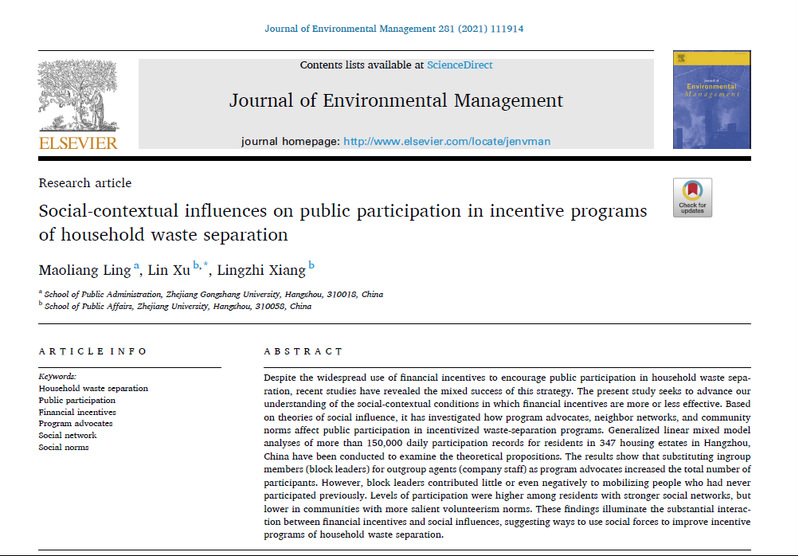近日,浙江大学公共政策研究院、浙江省公共政策研究院首席专家、浙江大学公共管理学院徐林教授等撰写的学术论文Social-contextual influences on public participation in incentive programs of household waste separation,被环境科学领域Top期刊《环境管理》(Journal of Environmental Management)录用,并于2021年3月21日发表。《环境管理》是环境科学领域的Top期刊,在该类别的265种期刊中排名33位,为SCI一区期刊,2019年的影响因子为5.647,五年影响因子为5.708。

文章指出,尽管激励措施被广泛用来鼓励公众参与家庭垃圾分类,但最近的研究表明,这一措施的成功程度参差不齐。本文基于社会影响理论,研究项目倡导者、邻里网络及社区规范如何影响公众对垃圾分类激励项目的参与。本文通过对中国杭州市347个住宅区的15万多条居民日常参与记录进行广义线性混合模型分析来检验理论假设。结果显示,用内部成员代替外部代理人作为项目倡导者,增加了参与者的总人数。但是,内部成员对动员从未参与过家庭垃圾分类的人的作用很小,甚至是负面的。而具有较强社会网络的居民参与水平较高,但在志愿服务规范较为突出的社区,居民参与水平较低。这些发现阐明了经济激励和社会影响之间的重要互动,提出了利用社会力量改善家庭垃圾分类激励项目的方法。
论文摘要:
Despite the widespread use of financial incentives to encourage public participation in household waste separation, recent studies have revealed the mixed success of this strategy. The present study seeks to advance our understanding of the social-contextual conditions in which financial incentives are more or less effective. Based on theories of social influence, it has investigated how program advocates, neighbor networks, and community norms affect public participation in incentivized waste-separation programs. Generalized linear mixed model analyses of more than 150,000 daily participation records for residents in 347 housing estates in Hangzhou, China have been conducted to examine the theoretical propositions. The results show that substituting ingroup members (block leaders) for outgroup agents (company staff) as program advocates increased the total number of participants. However, block leaders contributed little or even negatively to mobilizing people who had never participated previously. Levels of participation were higher among residents with stronger social networks, but lower in communities with more salient volunteerism norms. These findings illuminate the substantial interaction between financial incentives and social influences, suggesting ways to use social forces to improve incentive programs of household waste separation.

